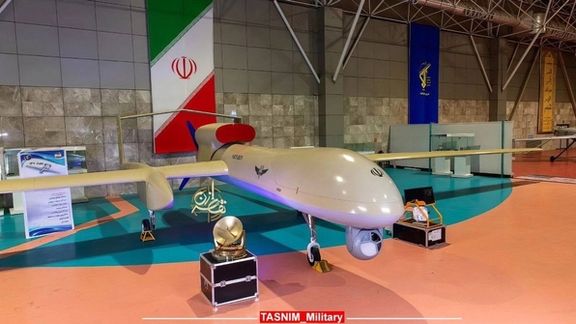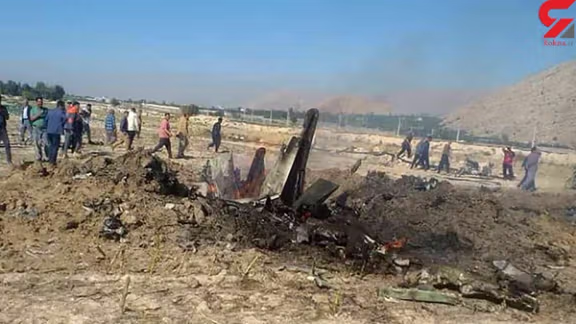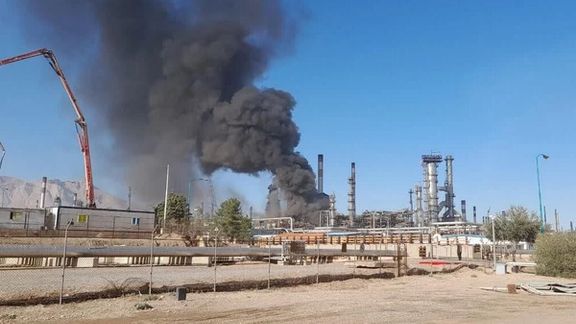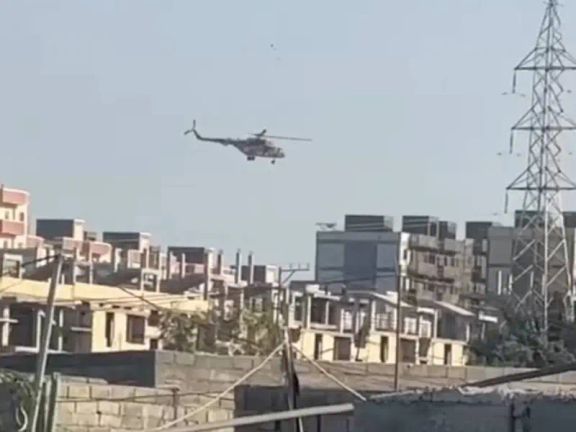Russia Continues To Attack Ukraine With Iranian Drones

Debris from a downed drone killed a civilian in the Odesa region after Ukraine's air force said it had destroyed 20 drones that Russia launched overnight.

Debris from a downed drone killed a civilian in the Odesa region after Ukraine's air force said it had destroyed 20 drones that Russia launched overnight.
Air defense systems destroyed nine Iran-made attack drones over Odesa, the region’s Governor Oleh Kiper said on the Telegram messaging app, calling it the third Russian air assault on the region in the past week.
Russia has been launching swarms of Iranian drones against infrastructure and civilian targets in Ukraine since October 2022. The drones are also used during missile attacks to overwhelm Ukrainian air defenses. Western countries have sanctioned dozens of individuals and entities involved in the supply of the kamikaze weapons.
"However, one of the downed drones fell into a residential area in Odesa district and exploded," Kiper said, adding that several houses were damaged, and one person was found dead in one of them afterwards.
The air force said its defense systems destroyed a cruise missile in addition to the drones. It said, without providing details, that Russia also launched an Iskander ballistic missile that "did not reach" its target.
The Russian air weapons were destroyed over Odesa, Kherson, Zaporizhzhia and Khmelnitskyi regions, the air force said.
On Saturday, the southern Ukrainian city of Kherson was hit by Russian drone attacks, local authorities reported.
The regional military administration said that one doctor was injured when the debris from a shot down an Iranian Shahed drone rained down on the hospital building in the port city.
Ukraine’s Operational Command South reported that it shot down nine Iranian-made Russian-operated drones over the Kherson region.
With reporting by Reuters, AP

A Sukhoi 22 fighter jet belonging to the Islamic Revolutionary Guard Corps (IRGC) crashed in Iran's southern Fars province on Saturday, according to state-run media.
The Director General of Airports in Fars Province confirmed the incident, stating that the crash occurred near Lake Parishan in Kazerun.
The semi-official ISNA news agency reported that the aircraft, described as "training-military type," crashed due to technical failure. The pilot managed to eject using a parachute, and there were no fatalities or injuries.
However, In an interview the governor of Kazerun confirmed that the pilot is currently hospitalized, suffering from a pelvic bone fracture.
The Sukhoi 22 is a single-seat bomber fighter aircraft manufactured in Russia, with the majority of the aircraft in the possession of the IRGC, originally owned by Iraq that Saddam Hussein sent to Iran not to lose them to US attacks.
The incident follows a similar one in August last year when another Sukhoi 22 fighter jet of the IRGC crashed at the Shiraz airbase, attributed to technical failure. In November 2017, in Sarvestan County, Fars Province, another aircraft of the same type crashed, resulting in the death of the pilot.
Aircraft accidents are not limited to the IRGC in Iran. In May 2022, two fighter jets of the Islamic Republic of Iran Army crashed within a few days, with one incident occurring in Esfahan Province, resulting in the death of the pilot and co-pilot.
Over recent years, several aviation accidents have led to the loss of military commanders and personnel. Ahmad Kazemi, the commander of the Ground Forces of the IRGC, lost his life in an aviation accident near Urmia on January 9, 2006.

Less than a week after a devastating fire engulfed the Birjand oil refinery in northeast Iran, another refinery in Esfahan faced a similar fate as it succumbed to flames on Saturday.
Mansour Shisheforoush, the director of provincial crisis management in Esfahan, disclosed in an interview with semi-official ISNA news agency that four individuals sustained injuries during the incident, with one person hospitalized due to severe burns.
The incident follows an incident on December 10 when all 18 hydrocarbon tanks at the Birjand oil refinery in South Khorasan were consumed by flames. The explosion and fire at the Birjand refinery occurred less than a year after an expansion project was inaugurated.
Deputy Governor of South Khorasan reported substantial damages amounting to an estimated 14 million USD incurred by the Birjand refinery in the aftermath of the incident.
Iran has witnessed a series of industrial accidents, including fires in oil facilities, petrochemical plants, and industrial centers in recent years. The incidents are often attributed to outdated technology, the use of substandard equipment, and the aging and deterioration of structures. While authorities have not provided comprehensive explanations for the incidents, they have attributed several high-profile sabotage attacks on facilities to Israel. However, Israel has not officially claimed responsibility for any of the incidents.
Iranian authorities have acknowledged the ongoing concern of both industrial and non-industrial "sabotage." Fereydoun Abbasi, a member of the Energy Commission of the Parliament, highlighted on Saturday, "Over time, a person may, due to dissatisfaction, family problems, or the influence of others, become a saboteur. A saboteur doesn't necessarily plant a bomb; sometimes, they engage in industrial sabotage, meaning they learn to tamper with electricity, water, or manipulate gas pressure."

New naval movements in the Middle East point to a possible US strike against the Iran-backed Houthis, as the group keeps on targeting vessels in the Red Sea.
Reports emerged Saturday that the Dwight D. Eisenhower Carrier Strike Group has moved from the Persian Gulf into the Gulf of Aden, off the coast of Yemen where the Houthis operate. The move could also be a measure of deterrence against the Houthis who have crippled international shipping with their daily attacks against commercial vessels.
The Biden administration has so far refused to strike back at Houthis, fearing, perhaps, that the Iranian regime would further unleash its proxies in the region and drag the US into a costly, uncertain, and likely unpopular war thousands of miles from home
But the Houthis' increasingly brazen operations seem to be shifting opinions at the White House and the Pentagon.
Politico quoted two unnamed Pentagon officials Saturday as saying that “top Biden administration officials are actively weighing options to strike back at Houthis in Yemen.” The same source suggested that the US military “has also provided options to commanders to strike the Houthis.”
Taking advantage of US hesitation, the Houthis have managed to disrupt shipping in the Red Sea with regular (and escalating) attacks on commercial vessels. Four of the world’s five largest shipping companies have halted their traffic through the Bab el-Mandeb Straits in the past two days.
Many fear that a prolonged halt in shipping in the Red Sea would affect the global economy, by driving up costs and re-igniting inflation, while disrupting supplies.
Currently, 12% of global trade passes through the Red Sea, according to a statement by the International Chamber of Shipping –which calls on “nations with influence in the region to stop the Houthis from attacking sailors and ships.”
The Biden administration has repeatedly warned the Houthis that they would not be spared if provocation continues. But so far the group has only escalated their operations.
On Saturday, the Pentagon confirmed that a US warship in the Red Sea had foiled a mass kamikaze drone attack by Houthi drones.
“USS Carney successfully engaged 14 unmanned aerial systems (UAS) launched as a drone wave from Houthi-controlled areas of Yemen,” read the Pentagon statement. “The UAS were assessed to be one-way attack drones and were shot down with no damage to ships in the area or reported injuries.”
A day before, two giants of shipping and logistics (Moller-Maersk and Hapag-Lloyd) announced they were pausing all journeys through the Red Sea, after Houthi attacks on their vessels.
Houthis say they would continue their operations as long as Israel continues its onslaught against Gaza. Initially they announced that their aim is to stop commercial ships headed to Israel, but later the threatened all vessels.
"While the Houthis are pulling the trigger, they're being handed the gun by Iran,” said White House national security advisor Jake Sullivan on Friday. “And Iran has a responsibility to it to take steps themselves to cease these attacks.”.
he Islamic Republic officials, however, have repeatedly affirmed their support for Yemen Houthis and have even threatened the US and its allies with "extraordinary problems" if they create a task force, as reported widely Friday.
Senator Bill Hagerty, a member of the Senate Foreign Relations Committee, Saturday decried Biden’s failure in dealing with the crisis. “Iran & the Houthis are increasing with impunity the dangers to commercial shipping through the Middle East,” he posted on X.

Iran's electoral system and its impact on governance have come under scrutiny this week, with both conservative and reformist commentators highlighting its problems.
Reformist commentator Abbas Abdi criticized the government's approach to the annual budget, noting that the Raisi Administration tends to present bills "for approval" rather than inviting parliamentary review. He argued that the recent rejection of the budget by the Majles (parliament) was a message to the government that parliament should have a say in bills presented.
Abdi also stated that by rejecting the budget bill, the parliament (Majles) wanted to make it known to the government that it has a say and can decide the fate of bills handed over by the government.
He pointed out that the development showed efforts for the unification of the government and parliament within a consolidated ultraconservative governing clique have remained futile.
The commentator was referring to efforts since 2020 to eliminate those who do not belong to the hardliner camp from positions of power. Majles is dominated by ultraconservatives, who also have a strong presence in the presidential administration.
Abdi explained that because of the nature of Iran’s parliamentary system, with no political parties governing the legislature, every lawmaker imposes a heavy burden on the budget to meet their own local and factional interests.

The dynamics between the parliament and the government is badly affected by the two factors of corruption and inefficiency, Abdi maintained, adding that rejecting the budget bill will not solve any problem. "Basically, the current parliament is unable to solve the problem between the two bodies and it needs to find another way to solve the dispute," headed.
Conservative commentator Nasser Imani, during a debate on Khabar Online, argued that Iran's electoral system fails to produce an efficient parliament. He noted the absence of political parties in Iran and the restrictions they face, especially since 2020 when many reformist and moderate candidates were disqualified.
Imani said, "Practically, we do not have any political parties in Iran. Those that exit are not allowed to have any election-related activity other than presenting a list of candidates ahead of every election."
In fact, even that has not been possible since 2020 when reformist and moderate candidates were effectively barred from taking part in elections as nearly all of their well-known candidates were disqualified either by the Interior Ministry or the Guardian Council.
"When we do not have political parties we cannot expect a lively election mood, and we cannot even ensure that the government has a mechanism to listen to the people and their demands," Imani said. He argued that "We have a parliament in which political parties are not represented. This is unprecedented in the world's parliamentary systems. In the absence of political parties with defined plans and platforms, unknown figures with little if any qualifications find their way to the parliament and then they have to discuss key issues such as annual budget."
Meanwhile, Mohammad Atrianfar, who was debating Imani, called for changes to reverse the current trajectory. “If we conclude that we cannot return from that wrong path, then we have to accept that there is no way for reform-minded people like me to participate in political activities in Iran."
Atrianfar argued that "If we want to be politically active, there are only three ways ahead of us: Either we should take action for a regime change, or we need to call for reforms. The third way is just to be passive."
He argued that reforms aim to improve the situation and cited former President Hassan Rouhani as an example of someone with a conservative background who pursued reformist goals by working to improve the country's situation.
In summary, many conservative and reformist commentators in Iran are critical of the country's electoral system, citing issues related to the budget, the absence of political parties, and the need for reforms to address governance challenges.

In the aftermath of an attack on the police headquarters in Iran, local media reported the continued presence of military helicopters over Chabahar city and its surroundings.
The Halvash website that covers developments in Sistan-Baluchestan Province in the southeast has released videos documenting the ongoing aerial activity.
Halvash noted that Revolutionary Guard forces have deployed dozens of military vehicles for patrolling and mobilizing personnel in Chabahar port, Rask, and neighboring areas. Informed sources revealed that on Saturday morning, three helicopters, accompanied by 40 to 50 military vehicles, departed from the Quds Headquarters of the Revolutionary Guards, heading towards Chabahar and Rask.
The Minister of Interior, Ahmad Vahidi, has traveled to the region in response to the crisis, and top government officials have vowed to track down those responsible for the attack.
The armed assault on the Rask police headquarters, was claimed by the Jaish al-Adl, a Sunni militant group. The poverty-stricken province, home to a significant Sunni population from the Baluch ethnic group, faces tensions with Iran's Shiite clerical rulers. Frequent clashes between security forces, Sunni militants, and drug smugglers are common in the region.
Jaish al-Adl, advocating for greater rights and improved living conditions for ethnic Baluchis, claimed responsibility for the attack. Conflicting figures have emerged, with official reports stating 12 officers killed and at least seven injured, while Jaish al-Adl insists on a higher toll of 50.
Government sources reported two attackers killed, one arrested, and the rest evading capture. In the aftermath, military forces allegedly fired on three Baluch civilians in Rask, resulting in two deaths and one arrest.